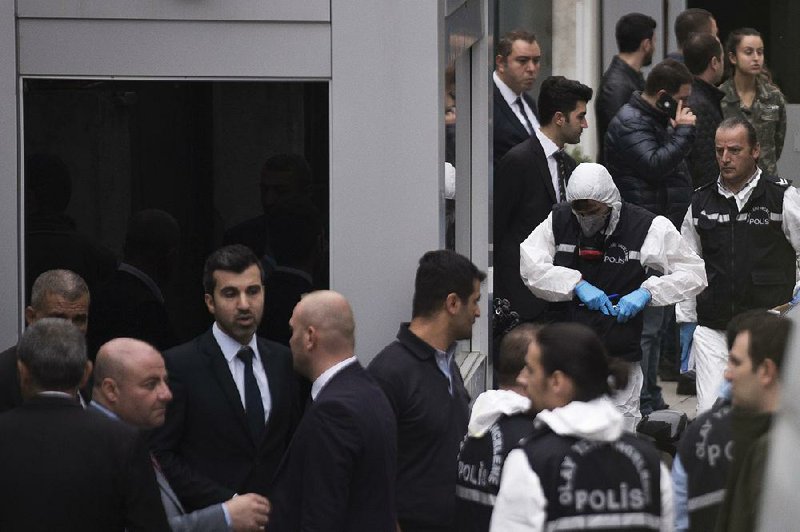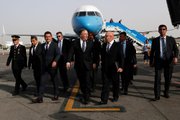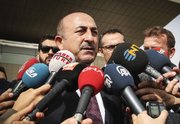ISTANBUL -- Turkish crime-scene investigators searched the home of the Saudi consul general in Istanbul on Wednesday in the disappearance of Saudi writer Jamal Khashoggi, and a pro-government newspaper published a gruesome account of the journalist's alleged slaying.
As Saudi Arabia's green national flag flapped overhead, forensics teams entered the residence, only 1.2 miles from the consulate where Khashoggi vanished Oct. 2 while trying to pick up paperwork to get married. It was the second-such extraordinary search of a site considered under international law to be sovereign Saudi territory after investigators spent hours in the consulate earlier this week.
The account published in the Yeni Safak newspaper alleged that Saudi officials cut off Khashoggi's fingers and then decapitated him at the consulate as his fiancee waited outside.
Hours later, The Washington Post published a column by Khashoggi that it said it received after he was reported missing, in which he pointed to the muted international response to ongoing abuses against journalists by governments in the Middle East.
"As a result, Arab governments have been given free rein to continue silencing the media at an increasing rate," Khashoggi wrote. He added: "The Arab world is facing its own version of an Iron Curtain, imposed not by external actors but through domestic forces vying for power."
The searches and the leaks in Turkish media have ensured the world's attention remains focused on what happened to Khashoggi, who went into a self-imposed exile in the U.S. over the rise of Saudi Crown Prince Mohammed bin Salman. It also put further strains on the relationship between the kingdom, the world's largest oil exporter, and its main security guarantor, the United States, as tensions with Iran and elsewhere in the Middle East remain high.
Flying back home after a visit to both Saudi Arabia and Turkey, U.S. Secretary of State Mike Pompeo remained positive about an ongoing Saudi probe into Khashoggi's disappearance, but he stressed that answers are needed.
"Sooner's better than later for everyone," Pompeo said.
The search of the consul's residence came 15 days after Khashoggi's disappearance -- and after police apparently thought they would be able to conduct the search Tuesday. Turkish Foreign Minister Mevlut Cavusoglu said Saudi officials had halted the earlier search, claiming that Consul General Mohammed al-Otaibi's family was still there.
Crime-scene technicians wore white coveralls, gloves and shoe covers entering the residence. It wasn't immediately clear what they hoped to find there, although surveillance video had showed diplomatic cars moving between the consulate and the residence nearly two hours after Khashoggi walked into the diplomatic post.
Turkey's private DHA news agency, without citing a source, said police wanted to inspect a "water well" in the garden of the residence.
Investigators also re-entered the consulate Wednesday night.
A high-level Turkish official previously said police found "certain evidence" of Khashoggi's slaying at the consulate, without elaborating. The official spoke on condition of anonymity because the investigation was ongoing.
The report by the Yeni Safak newspaper cited what it described as an audio recording of Khashoggi's slaying. It described the recording as offering evidence that a Saudi team immediately accosted the 60-year-old journalist after he entered the consulate.
Al-Otaibi could be heard on the tape, telling those allegedly torturing Khashoggi: "Do this outside; you're going to get me in trouble," the newspaper reported.
One of the Saudis reportedly replied: "Shut up if you want to live when you return to [Saudi] Arabia."
State Department spokesman Heather Nauert said Pompeo did not listen to the audio tape during his trip to Turkey.
Al-Otaibi left Turkey on Tuesday, Turkish state media reported.
TRUMP, SAUDI KING
President Donald Trump, who initially came out hard on the Saudis over the disappearance but since has backed off, said Wednesday that the U.S. wanted Turkey to turn over any audio or video recording it had of Khashoggi's alleged killing "if it exists."
He was then asked if he believes Turkey has such material. "Probably does, possibly does," Trump replied.
"I'm not giving cover at all," Trump added, referring to Saudi Arabia. "They are an ally."
On Tuesday, however, Trump suggested the world should not rush to judgment against Saudi Arabia, saying the global outcry is akin to a case of "you're guilty until proven innocent."
He spoke by phone Monday with King Salman, and Trump said the king denied any knowledge of what happened to Khashoggi.
Speaking to the Fox Business Network on Wednesday, Trump said, "We'll get down to the bottom of it. I hope that the [Saudi] king and the crown prince didn't know about it. That's the big factor in my eyes, and I hope they haven't."
Trump's previous warnings over the case drew an angry response Sunday from Saudi Arabia and its state-linked media, including a suggestion that Riyadh could wield its oil production as a weapon. The U.S. president wants King Salman and the Organization of the Petroleum Exporting Countries to boost production to drive down high oil prices, caused in part by the coming re-imposition of oil sanctions on Iran in November.
Pompeo, wrapping up a trip to Saudi Arabia and Turkey to discuss the crisis over the missing journalist, made a point to stress areas where the kingdom and America cooperate.
"We have lots of important relationships -- financial relationships between U.S. and Saudi companies, governmental relationships ... the efforts to reduce the risk to the United States of America from the world's largest state sponsor of terror, Iran," he said. "We just need to make sure that we are mindful of that when we approach decisions that the United States government will take when we learn all the facts associated with whatever may have taken place."
However, Pompeo said there were clear lines that America would not stand to see crossed.
Pompeo's meetings in Turkey's capital, Ankara, were in sharp contrast to his talks a day earlier in Riyadh, where Saudi leaders repeated their denials that they had no knowledge of Khashoggi's fate after he entered the Saudi consulate.
Before leaving Riyadh, Pompeo told reporters that Saudi officials pledged they would hold any wrongdoers accountable, no matter how high their positions.
Asked if the Saudis told him whether Khashoggi was alive, Pompeo declined to answer. "I don't want to talk about any of the facts," he said. "They didn't want to either, in that they want to have the opportunity to complete this investigation in a thorough way."
Prominent U.S. newspapers have reported, citing anonymous sources, that Saudi officials may soon acknowledge Khashoggi's slaying at the consulate but blame it on a botched intelligence operation. That could seek to give the kingdom a way out of the global firestorm of criticism over Khashoggi's fate.
However, no major decisions in Saudi Arabia are made outside of the ultraconservative kingdom's ruling Al Saud family.
In New York, House Speaker Paul Ryan, R-Wis., said the episode "could be a real setback" for Saudi Arabia but predicted that a great deal of the kingdom's relationship with the United States "will persist no matter what."
Asked in a television interview that aired Wednesday about reports that Khashoggi was the victim of an interrogation gone wrong, Ryan said that would be "really disturbing."
"If this is the case, it's atrocious, and we have laws for this," Ryan said on CBS This Morning, raising the possibility that Saudi Arabia could face U.S. sanctions.
Senate Majority Leader Mitch McConnell, R-Ky., also predicted U.S. backlash if a Saudi link is proved, but he said Congress is awaiting details from Pompeo on his meetings.
"I can't imagine there will be no response" to Khashoggi's death, McConnell said.
Information for this article was contributed by Suzan Fraser, Fay Abuelgasim, Jon Gambrell, Matthew Lee, Zeke Miller, Jonathan Lemire and Catherine Lucey of The Associated Press; by Carol Morello, Loveday Morris, Kareem Fahim, John Wagner, Amber Phillips and Brian Murphy of The Washington Post; and by Ben Hubbard, Rick Gladstone and Mark Landler of The New York Times.
A Section on 10/18/2018


